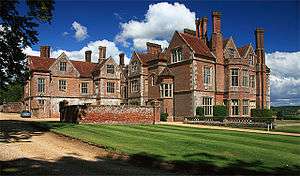Breamore House

Breamore House is an Elizabethan manor house noted for its fine collection of paintings and furniture and situated in Breamore, just north of Fordingbridge, Hampshire, England.
Breamore House was completed in 1583 by the Dodington family. The building underwent minor changes in the 18th century and underwent considerable restoration after a major fire in 1856.
Purchased in the 18th century by Sir Edward Hulse, physician to Kings George I and George II,[1] the home is still inhabited by the Hulse family, who became baronets (see Hulse baronets).[2][3] Thanks to an intermarriage with Dame Elizabeth, daughter of Sir Richard Levett, Lord Mayor of London and owner of Kew Palace, the Hulse family acquired many heirlooms of the Sussex Levetts, an ancient Norman family, which are on display in the house.[4] (Levett's other daughter Frances married Thomas Lewis Esq. of St. Pierre, Monmouthshire, Wales; his daughter Mary married Abraham Blackborne,[5] a London merchant who lived at Clapham,[6] and whose son Abraham, vicar of Dagenham, married Frances Fanshawe,[7] daughter of Thomas Fanshawe of Parsloes Manor.)[8][9][10]
Elizabeth Hulse, only daughter of Sir Edward Hulse, M.D., Baronet, and physician to Queen Ann, King George I and King George II, was married in 1757 to John Calvert of Albury Hall, Hertfordshire.[11] (John Calvert was member of Parliament for Wendover in 1754 and later for Hertford.) The wedding was performed by Abraham Blackborne, vicar of Dagenham, Essex.[12] The brothers Thomas, Edward and Richard, sons of Sir Edward Hulse and his wife Elizabeth, all attended the University of Cambridge.[13] A fourth son, Levett, died as an infant.
Breamore House was used as one of the locations for the 2005 film Pride & Prejudice. The house also served as a filming location for HBO's 2009 special on Winston Churchill entitled Into the Storm, where the house stood in for Chequers, the home of the Prime Minister.[14]
References
- ↑ Sir Edward Hulse was the son of Edward Hulse, MD, physician to the Court of the William, Prince of Orange in 1677, and Treasurer of the Royal College of Physicians, London.
- ↑ Breamore House, Hampshire, British History Online
- ↑ History, gazeteer, and directory of Hampshire and the Isle of Wight, William White, 1878
- ↑ The Baronetage of England, John Debrett, 1840
- ↑ Following Blackborne's death, his widow Mary Levett, also mother to barrister Levett Blackborne who became heir of Sir Richard Levett, remarried Robert Thoroton of Screveton Hall, Flintham, Nottinghamshire in 1722, who was descended from Thomas Thoroton, brother and heir of the famous antiquary Robert Thoroton. Mary Blackborne Thoroton nee Levett had several children by Blackborne, including a daughter Elizabeth, who married Charles Chaplin of Tathwell Hall. The Thoroton Hildyard family continues to reside at Flintham today.
- ↑ Burial of Abraham Blackbourn, Gent., of Clapham, 1721, Richmond, Surrey, The Publications of the Surrey Parish Register Society, London, 1905
- ↑ The Fanshawe manor at Dagenham, Valence House, is the only surviving of the five manor houses of Dagenham, and is today a museum."Archived copy". Archived from the original on 2008-07-04. Retrieved 2008-11-02.
- ↑ The House of Commons, 1690-1715, David Hayton, 2002
- ↑ Levet tombs, Saint Anne's Church, Kew, Richmond, Surrey, British History Online
- ↑ Abraham Blackbourne, Visitation of England, Joseph Jackson Howard, England College of Arms, 1906
- ↑ One of Elizabeth Hulse's brothers was Sir Edward Hulse, Bart., who married Hannah Vanderplanck; the other was Richard Hulse, who served as High Sheriff of Kent in 1768.
- ↑ The Register Book of Marriages Belonging to the Parish of St. George, Hanover Square, Middlesex, London, 1886
- ↑ "Hulse, Thomas (HLS753T)". A Cambridge Alumni Database. University of Cambridge.
- ↑ The South-Central Region on Screen
External links
| Wikimedia Commons has media related to Breamore House. |
- Breamore House
- An alternative site created by the Butler
- Hulse of Hampshire, John Burke, A General and Heraldic Dictionary of the Peerage and Baronetage of the British Empire
- Monumental inscriptions, Wilmington church graveyard, Kent Archaeological Society, kentarchaeology.co.uk
Coordinates: 50°58′14″N 1°47′02″W / 50.9705°N 1.7839°W